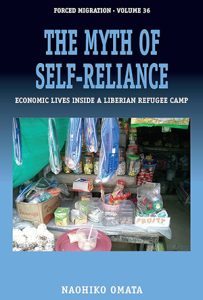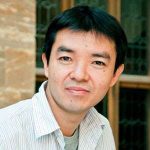The Myth of Self-Reliance: Economic Lives Inside a Liberian Refugee Camp

Author: Naohiko Omata
Publisher: Berghahn Books
Year of Publication: 2017
Print Length: 194 pages
Genre: Non-Fiction / Social Science
Area: Bubuduram Refugee Camp, Ghana, Liberia
People: Liberian
Topic: Myth & Reality, Asylum & Refugee System, Refugees & Forced Migration, Refugees’ Roles & Self-Reliance, Refugee Economies, Refugee Livelihoods, Refugee Management/Governance, Refugee-Led Organisations & Networks, Refugee Repatriation, Refugee Reintegration & Reconstruction, Protracted Refugee Situations, Responses to Refugees, The Status of Refugees, Exile & Exodus, Development, Economy, The Right to Work, History, Social Network
For many refugees, economic survival in refugee camps is extraordinarily difficult. Drawing on both qualitative and quantitative research , this volume challenges the reputation of a ‘self-reliant’ model given to Buduburam refugee camp in Ghana and sheds light on considerable economic inequality between refugee households.
By following the same refugee households over several years, The Myth of Self-Reliance also provides valuable insights into refugees’ experiences of repatriation to Liberia after protracted exile and their responses to the ending of refugee status for remaining refugees in Ghana.
Table of Contents
List of Illustrations
Acknowledgements
List of Abbreviations
Maps
Introduction. Bubudram: An Exemplary Refugee Camp?
1. ‘Guests Who Stayed Too Long’: Refugee Lives in a Protracted Exile
2. Economic Lives in Bubuduram
3. The Household Economy in the Camp
4. The Roots of Economic Stratification: A Historical Perspective
5. Repatriation to Liberia: The ‘Best’ Solution for Refugees?
6. The ‘End’ of Refugee Life? When Refugee Status Ceases
7. Developing a Better Understanding of Livelihoods, Self-Reliance and Social Networks in Forced Migration Studies
Epilogue. Bubuduram in 2015
References
Index

Naohiko Omata is Associate Professor and Senior Researcher at the Refugee Studies Centre (RSC). Before joining the RSC, Naohiko was Senior Teaching Fellow in Development Studies at the School of Oriental and African Studies (SOAS) at the University of London. Previously, he worked as a practitioner and consultant for UNDP, UNHCR, and international and local NGOs in various Sub-Saharan African countries. Based on extensive research in West Africa, Naohiko has published widely on refugee livelihoods, rights and repatriation including articles in the Journal of Refugee Studies, Journal of Ethnic and Migration Studies and Community Development Journal. Before starting his career in forced migration and international development, he worked in the private sector in Japan and the United States. Naohiko received his PhD in Development Studies at SOAS, University of London; he also holds an MA in Forced Migration and Humanitarian Aid from the Fletcher School at Tufts University and a BA in Law from the University of Tokyo.
Source: https://www.qeh.ox.ac.uk/people/naohiko-omata
More from Naohiko Omata in this library, click here.
